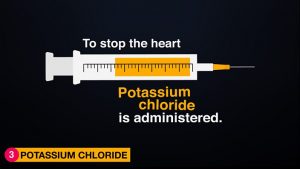Why is Potassium Chloride used in infants’ vaccines?
Cardiac arrest in the pediatric population
As of 2013, Sudden Unexpected Infant Death (SUID) accounted for about one in seven infant deaths (about 3,700 annually), with about 20% thought to be related to cardiac vulnerabilities activated by exogenous stressors.
KCl
Potassium chloride is also commonly known as “Muriate of Potash”
used in medicine, scientific applications, and judicial execution through lethal injection. The majority of the potassium chloride produced is used for making fertilizer. Side effects can include gastrointestinal discomfort including nausea and vomiting, diarrhea and bleeding of the gut. Orally it is toxic in excess, high doses can cause cardiac arrest and rapid death.
Cardiac problems described in vaccine package inserts
Children born in the U.S. are 76% more likely to die before their first birthday than infants born in 19 other wealthy nations, and sudden infant deaths are one of the top five causes.
Many vaccine package inserts list cardiac-related adverse events that have occurred either during clinical trials or during postmarketing. For example:
- Recombivax hepatitis B vaccine: hypotension, tachycardia
- Engerix hepatitis B vaccine: hypotension, tachycardia, heart palpitations
- Infanrix (diphtheria-tetanus-acellular pertussis) vaccine: sudden infant death syndrome
- Boostrix and Adacel (tetanus-diphtheria-acellular pertussis) vaccines: myocarditis
- Flulaval and Fluzone (influenza) vaccines: chest pain
